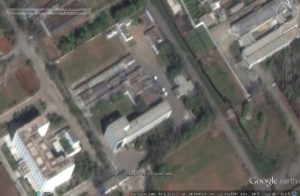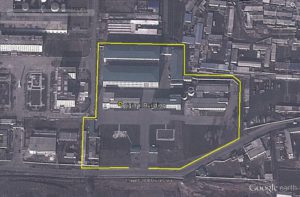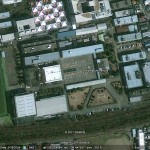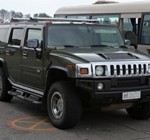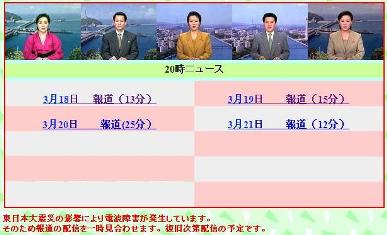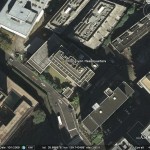
Pictured above (Google Earth): The Chongryon headquarters building in Tokyo ( 35.697001°, 139.743435°).
UPDATE 10 (2105-2-11): According to the Japan Times, the Chongryun building is still under control of the DPRK, even after it was sold:
The building and the land it stands on are mortgaged to a Chongryon-affiliated company on whose board sit a former member of the Supreme People’s Assembly of North Korea and a former president of Korea News Service, a North Korean news agency, people familiar with the situation said.
Records show ownership of the building and land was transferred to a real estate firm in Sakata, Yamagata Prefecture, on Jan. 28 from a real estate company in Takamatsu, Kagawa Prefecture, which place the successful auction bid.
The fact that the property is mortgaged to a Chongryon-affiliated company suggests the organization played a role in shifting ownership to the Sakata real estate firm, people close to Japanese public security authorities said.
The Sakata real estate firm is expected to lease the property to Chongryon so that it can continue using the building, informed sources said.
UPDATE 9 (2015-2-6): According to the South China Morning Post, there is a new fog of suspicion that has set over the former Chongryun headquarters:
A former Chinese diplomat once named as a spy in Japan’s parliament has business links to an obscure firm that has purchased the de facto North Korean embassy in Tokyo.
Wang Xinghu, who was previously stationed at the Chinese embassy but claims to have become a businessman, has set up a consultancy called HKS Japan with Takeharu Inamura, a Japanese national, according to records seen by the South China Morning Post.
It emerged last week that Inamura’s other company, a small warehousing firm that is called Green Forest, paid ¥4.4 billion (HK$290.7 million) to buy Pyongyang’s biggest asset in Japan, the headquarters of the quasi-official Chongryon organisation.
But Green Forest has limited resources and experience in the property sector, and questions are being asked about where the firm acquired the cash.
Chongryon’s imposing headquarters was initially put up for auction in 2012 at the request of the Japanese government’s debt collection agency after the association for North Korean residents of Japan defaulted on debts of more than ¥62 billion.
After two initial attempts to purchase the building fell through – one by a religious group with links to an organised crime gang with North Korean members and the second a shell company based in Mongolia but with no assets and no traceable history – the property was sold last year to Marunaka Holdings, a Japanese construction company.
After paying ¥2.21 billion for the building and demanding that Chongryon vacate it so the plot could be redeveloped, Marunaka suddenly changed its mind and sold the property – for ¥4.4 billion and a swift profit – to Inamura’s company, which is based in rural Yamagata Prefecture, has no history or licence to operate in the real-estate sector. Its annual turnover is a paltry ¥19 million.
In corporate documents, Chongryon is now listed as the mortgagee and will be allowed to remain in the property. The sale took place on January 28.
Phone calls to the offices of both HKS Japan and Green Forest were not answered. Local media have reported that Inamura lives in a small rented apartment in Tokyo’s Nakano district, but the curtains have remained drawn and the lights off since the deal was revealed.
Wang – who was named by Japanese politician Katsuei Hirasawa in the Diet in July 2012 as a Chinese spy – is apparently out of the country. Hirasawa is a former official of the Japanese police whose responsibilities primarily focused on foreign intelligence issues. At the time Hirasawa made his allegations, the Sankei Shimbun reported Wang was a member of to China’s Ministry of State Security.
Chongryon is also refusing to talk to the Post.
A Japanese human rights activist who is demanding that more international pressure be applied to the North Korean regime says he believed China was involved in the transaction.
“Wang cannot fund the Chongryon headquarters deal without the consent and financing of the Chinese government,” claimed Ken Kato, director of Human Rights in Asia and a member of the International Coalition to Stop Crimes Against Humanity in North Korea.
“It is a mystery why China has decided to spend billions of yen to save Chongryon’s face,” he added. “I am sure that China understands that once their involvement in the deal is revealed, it will anger the Japanese public.
“The Chongryon HQ was sold not because of ‘discrimination’ or ‘persecution,’ as they are insisting,” he added. “It was sold because they refused to pay back a debt that Japanese taxpayers were forced to shoulder.”
Kato is indignant North Korea is refusing to honour its debts in Japan despite spending vast sums on nuclear and ballistic missile programmes.
There have been several years of friction between China and erstwhile ally North Korea, and if Beijing funded the purchase of the building, it could be a sign that China wants to get the relationship back on track.
Beijing was angered when Pyongyang ignored its pressure to not go ahead with a third underground nuclear test in 2013 and, subsequently, a series of missile test-launches.
Since Beijing got tough on the regime of Kim Jong-un – including halting all supplies of fuel oil – North Korea turned its attentions to Russia and has been busily courting its new ally. Moscow and Pyongyang have agreed to carry out a series of military drills this year, major Russian investment in North Korean infrastructure is under way, and Kim has reportedly accepted an invitation to attend a ceremony marking the end of the second world war in Moscow in May.
UPDATE 8 (2014-11-7): Chongryun has lost its appeal for the forced sale of its Tokyo headquarters. According to a media report:
Chongryun, the association that represents North Korean residents of Japan, is running out of ways to keep its most prized asset after the Supreme Court ruled that the sale of its headquarters to a Japanese real estate developer would go ahead.
The dismissal of the appeal by Chongryun represents “a serious loss of face” for the organisation and the North Korean leadership, according to analysts, and could even serve to weaken links between the regime’s citizens in Japan and their homeland.
“They have not made any official comments yet but it is clear that this will be a major disappointment because it is such a serious loss of face,” Ken Kato, a Tokyo-based human rights activist, said.
“I also hope that North Koreans living in Japan … are able to stand up against the regime. Many of them have relatives in North Korea and they are effectively held as hostages to ensure that the people here send back ‘donations’ that are then spent on developing missiles and nuclear weapons,” Kato said. “I hope they wake up to the reality.”
Representatives of Chongryun could not be contacted but sources said last month that retaining a building that served as an embassy in Japan had been made a priority by North Korean leader Kim Jong-un.
Chongryun leader Ho Jong-man visited North Korea for the first time in eight years in October and, although he was not able to meet him in person, was handed a personal letter from Kim.
One of the instructions in the letter was to secure the continued use of the Chongryun headquarters in Tokyo.
The Supreme Court’s decision makes that target effectively impossible and will not go down well in Pyongyang.
The legal decision is in favour of Marunaka Holdings, which had lodged a bid of 2.21 billion yen (HK$149.5 million) for the building and the prime 2,387 square metre plot that it occupies in Chiyoda Ward.
Moves to sell the building began in March after the government-backed Resolution and Collection called in loans amounting to more than 62 billion yen that it had extended to the residents’ association.
Chongryun initially attempted to sell the property to a Kagoshima-based religious order that would permit the organisation to remain in residence. It was later alleged that the temple had links to underworld groups. The deal fell through when the temple was unable to raise the funds.
The next bidder was a mysterious Mongolian company known as Avar that was using an address in Ulan Bator but had no presence at the building and had never previously purchased a property in Japan.
Analysts believe it was a front for the North Korean government. That transaction was blocked by authorities in Japan for a lack of transparency, triggering a third round of bidding.
UPDATE 7 (2014-4-11): DPRK claims to send funds to Chongryun. According to KCNA:
Kim Jong Un Sends Educational Aid Fund and Stipends to Children of Koreans in Japan
Pyongyang, April 11 (KCNA) — Supreme leader Kim Jong Un sent educational aid fund and stipends amounting to 207.8 million yen to the General Association of Korean Residents in Japan for the democratic national education of children of Koreans in Japan on the occasion of the 102nd birth anniversary of President Kim Il Sung.
The educational aid fund and stipends sent by Generalissimos Kim Il Sung and Kim Jong Il and Marshal Kim Jong Un in 160 installments total 47,331,150,390 yen.
Since the Mangyongbong-92 is no longer traveling the East Sea/Sea of Japan, I wonder how the funds will be transferred.
The Chongryun have seen bad financial news lately:
1. Chongryun headquarters in central Tokyo was recently auctioned off for debts incurred helping the DPRK get through the Arduous March.
2. Chongryon schools are not eligible for some Japanese education subsidies.
UPDATE 6 (2014-3-29): KCNA reports (surprise!) that the DPRK is not happy about the sale of the Chongryun headquarters building. Below are two related articles:
Japanese Authorities Warned of Their Moves to Seize Korean Hall of Chongryon
Pyongyang, March 29 (KCNA) — The Committee for Aiding Overseas Compatriots of Korea made public a statement on Friday denouncing the Japanese authorities for their extremely dangerous moves to stifle the General Association of Korean Residents in Japan (Chongryon) and Koreans in Japan.
On March 24 the Japanese authorities took such fascist action as instigating the Tokyo District Court to make an illegal decision to allow the sale of the land and building of the Korean Hall of Chongryon.
This is a wanton violation of the dignity and existence right of Chongryon and Koreans in Japan and a grave infringement upon the sovereignty of the DPRK, the statement said, adding:
The Japanese authorities are feigning ignorance of the fact, noting that the decision was made by a “judiciary organ” in a bid to evade the blame for seizing the Korean hall. But this is no more than an excuse to cover up their sinister criminal purpose.
It is their sinister political scenario to deprive the Central Standing Committee of Chongryon of the base of its activities and thus weaken the authority of Chongryon, a model of Juche-based overseas Koreans’ movement, and dampen the elated patriotic enthusiasm of Koreans so as to stamp out the movement of Koreans in Japan.
The statement went on:
Now that the Japanese authorities deliberately touched off distrust at a time when confidence-building is required for improving the DPRK-Japan relations more urgently than ever before the DPRK is compelled to take corresponding measures.
If the Japanese authorities persist in their moves to seize the Korean Hall despite the warning of the DPRK, they will be wholly responsible for the consequences to be entailed by them.
Illegal Decision of Tokyo District Court Slammed
Pyongyang, March 29 (KCNA) — The Tokyo District Court made a decision to allow the sale of the land and building of the Korean Hall of the General Association of Korean Residents in Japan (Chongryon) under the backstage wire-pulling of the Japanese authorities. The spokesman for the Democratic Lawyers Association of Korea Saturday released a statement disclosing the illegality of the decision.
The statement says:
The illegality of the decision finds its vivid manifestation in that the court selected a disqualified company as a successful bidder by fraud and swindle.
The Tokyo District Court had delayed the announcement of the results of auction of the Korean Hall of Chongryon, which was made in October of 2013. On March 20, it reopened the tenders for it for no reason all of a sudden and made the decision to allow the sale to the Marunaka Holdings Co. Ltd., Japan.
As far as the above-said company is concerned, it had already been disqualified as it underbid others in October last year and took back bid bond from the court.
In particular, it is a precedent of the Japanese courts that in case the relevant court returned the bid bond to a disqualified company it would not make a decision to allow the sale to it.
Therefore, it was a crude violation of the law in every aspect that the court chose the above-said company as a successful bidder.
The illegality of the decision of the Tokyo District Court is also evidenced by the double-dealing attitude of the Resolution and Collection Corporation, a creditor.
When the issue of the Korean Hall presented itself, the Corporation made a hostile and discriminating demand that Chongryon should repay a total amount plus interest though it has settled issues with other debtors in a friendly manner.
But the Corporation kept mum about the decision of the Tokyo District Court to sell the Korean Hall at a price less than half the actual one.
The Japanese authorities has long regarded the Korean Hall of Chongryon on which the flag of the DPRK is fluttering as a thorn in their flesh and run the whole gamut of plots to seize it.
That was why the Tokyo District Court staged an unprecedented farce in disregard of the Japanese law, precedents of the courts and practices of the basic procedures for tenders
The Democratic Lawyers Association of Korea categorically rejects the decision of the Tokyo District Court and declares internally and externally that the illegal decision is invalid, the statement says.
The Japanese authorities had better halt their moves to seize the Korean Hall, though belatedly, if it thinks of its face as a “law-governed state” even a bit and has real intention to improve the relations with the DPRK, the statement concludes.
UPDATE 5 (2014-3-24): A Japanese estate agency has been approved to buy the property. According to NTD:
A court ruled Monday that a Japanese estate agency could buy the Tokyo property that serves as North Korea’s de facto embassy, after an earlier bid fell through.
The decision from the Tokyo District Court drew an immediate and angry reaction from Chongryon, the organisation that represents North Korean interests in Japan in the absence of diplomatic ties.
“This is an unfair decision. We cannot accept it,” said an organisation spokesman, adding that an appeal would be lodged.
The site — a 2,390-square-metre (25,725-square-feet) plot and 10-storey building occupied by Chongryon — was put up for auction after it was seized by authorities over unpaid debts.
Monday’s ruling gave real estate firm Marunaka Holdings the right to buy the building for 2.21 billion yen ($22 million), after a winning bid from an obscure Mongolia-registered company fell apart.
The Avar Limited Liability Company had won an auction in October with a bid of 5.01 billion yen, beating Marunaka’s offer. But the court disqualified the offer several months later reportedly due to flawed documentation amid questions over whether the firm had links to Pyongyang.
Japanese law bars an organisation forced to sell assets from taking part in an auction of them.
The Japanese firm is planning to remove the North Korean-linked organisation from the property, reports said, but it was unclear if it still planned to go through with the purchase following the judgement.
Hundreds of thousands of ethnic Koreans live in Japan, mostly a legacy of those who emigrated or were forced to move to Japan during its 1910-1945 colonial rule of the Korean peninsula.
About 10 percent are believed to be affiliated with Chongryon, which charges that the community is persecuted by authorities and harassed by right-wing activists.
UPDATE 4 (2014-1-23): NK News reports that the mysterious Mongolian firm has been blocked from purchasing the former headquarters building.
A Japanese court has blocked a Mongolia-based company’s bid to buy the Tokyo headquarters of the main pro-North Korea organization in Japan, Chongryon.
After months of screening, the Tokyo District Court announced on Thursday that due to purchase irregularities it would not allow the Ulan Bator-based Avar Limited Liability Company to purchase the property, which still serves as the headquarters for Japan’s main pro-North Korea organization.
The Mongolian firm, which had previously won an October 2013 auction for the building with a 5.01 billion yen (U.S. $48 million bid) bid, was rejected by the court because a certificate it submitted to support the purchase appeared to be a color photocopy and did not bear the official seal of the Mongolian government.
“It is a company on paper,” Hideshi Takesada, an expert on regional security at Takushoku University in Tokyo, told NK News on Thursday.
“With the bid tendering highly unlikely to be successful, Chongryon will be able to stay at the headquarters building and use the land. In a sense, the Japanese government is doing a favor for North Korea,” Takesada said. Takesada is a former executive director of the National Institute for Defense Studies in Tokyo, the Japanese Ministry of Defense’s think-tank.
UPDATE 3 (2013-10-22): Apparently funding fell through for the Buddhist group, and the building was put up for sale again. A Mongolian firm stepped forward to buy the building, but this was halted over fears that the new firm was a front for North Korean interests. According to the South China Morning Post:
The Tokyo District Court acted yesterday in response to a petition for an injunction on the sale filed by Ken Kato, director of Human Rights in Asia. Kato’s request pointed out that would-be buyer Avar was registered at an address in Ulan Bator, but the company apparently had no presence there.
When a Japanese television team arrived at the Mongolian address to ask about the purchase of the 10-storey building that is now occupied by Chongryon, the organisation that represents North Korean residents of Japan, and the prime plot it occupies in Chiyoda Ward, they were met by a bemused woman.
She told the TV crew her family had been living in the apartment for seven years and had never heard of Avar.
“I told the court that this was a typical case of money laundering and that the court cannot permit the transaction to go ahead,” Kato told the South China Morning Post. “The address is fake and the registration of the company must therefore be illegal.”
No deadline has been set for the court to make a decision on whether the transaction will go ahead, but Kato is confident any investigation will lead back to the North Korean leader. “Kim Jong-un wants to save face and not lose this property and I’m sure the decision to pay more than the market value is a case of a dictator’s whim,” he said.
The minimum price for bidders for the property was set at 2.13 billion yen (HK$168 million), while a previous deal to buy the building in May for 4.52 billion yen fell through when the buyer, the chief priest of Saifukuji Temple, was unable to raise the funds by the deadline. Kato said it was therefore curious that the latest sale price was 5.01 billion yen.
“The buyer could have got it for a lot less than that and I believe they offered so much in the hope no answers would be asked and the real purchaser could remain anonymous,” he said.
That was always likely to be a vain hope, given the interest in the property, which was put on the market in March by the government-backed Resolution and Collection Corp. in an effort to recoup loans of 62 billion yen that it extended to the residents’ association after the collapse of a number of financial institutions for North Korean residents of Japan.
The involvement of a Mongolian firm also raised eyebrows in Japan, as no Mongolian firm has ever purchased a building in Tokyo and there are very few Mongolian companies with enough cash to carry out such a deal.
As well as the suggestion that Avar is a front company for the North Korean regime, there has also been speculation that the Mongolian government might be involved as part of the burgeoning relationship between the two regimes.
UPDATE 2 (2013-3-27): A Buddhist order on good terms with the Chongryun won the property auction and will allow the Chongryun to remain on the premises. According to the Japan Times:
The Kagoshima temple offered ¥4.5 billion, the highest among four bidders, to acquire the land and the Chongryon building.
“We will keep the building as it is and make it a base of harmony among ethnic groups in Asia, including North Korea,” said Saifuku Temple leader Ekan Ikeguchi.
“The function of our headquarters will be maintained for the time being, at least,” a Chongryon official said. “We feel relieved.”
The government-backed Resolution and Collection Corp. put the premises out to tender to recoup loans of about ¥62.7 billion it made to Chongryon.
UPDATE 1 (2013-3-13): The Wall Street Journal’s Japan Real Time reports that the auction has finally begun on the Chongryun’s headquarters building in central Tokyo. According to the article:
Bidding has begun for the repossessed central headquarters of the General Association of Korean Residents in Japan, North Korea’s de-facto embassy in the country. It’s an attempt by the Japanese government to get back some of the ¥62.7 billion owed by the pro-Pyongyang group, also known as Chongryon, and comes as the reclusive regime faces a new round of sanctions and international condemnation following its third nuclear test.
Built in 1986, the 10-story office building has two basement floors and is situated on a 2,390 square-meter piece of land in a prime location in central Tokyo. The Tokyo District Court said in its assessment of the building that some portions of it showed signs of age-related deterioration as well as damage incurred during the massive 2011 earthquake that shook northeastern Japan.
Analysts say that as the auctioneer’s hammer falls, so falls the fortunes of the once-influential group.
“Losing its central headquarters is symbolic of Chongryon’s decline,” said Hajime Izumi, Professor of International Relations at Shizuoka University. “While the organization will survive, I expect it to face increasing difficulty maintaining itself,” he said.
Founded in 1955 as an organization representing the pro-North Korean members of Japan’s ethnic Korean minority, Chongryon has been responsible for pumping out North Korean propaganda and has been operating banks, a newspaper and numerous schools for Korean residents in Japan.
The group has also been a reliable source of hard cash for Pyongyang, with members sending back a large portion of revenue accumulated through numerous “pachinko” gambling parlors and real-estate businesses operated across the nation.
But Yoshifu Arita, an upper house lawmaker in Japan’s parliament, said the organization faced severe head-winds in 2002 when the late Kim Jong Il admitted during a meeting with then-Prime Minister Junichiro Koizumi that North Korean agents had kidnapped Japanese nationals in the 1970s and 1980s.
“This led to a massive public backlash toward North Korea as well the organization,” he said. “It led to many disillusioned members leaving Chongryon as pressure on them mounted.”
Chongryon’s debt stems from a network of credit unions for pro-North Korean residents of Japan that collapsed and had to be bailed out by the government-backed Resolution and Collection Corporation in the late 1990s and early 2000s. The debt has been transferred to Chongryon, which has been sued by the RCC for repayment.
A 72-year-old South Korean businessman living in Kobe, who used to be affiliated with Chongryon, added that the younger generation of Koreans in Japan also felt less of a link and patriotism toward Pyongyang. And with Japan’s long economic malaise following the burst of its debt bubble in the early 1990s, “pro-Pyongyang supporters don’t have the cash or the will to lend a hand to the organization, even when its headquarters are about to be sold off,” added the businessman, who asked not to be identified.
Bids for the building, which began Tuesday, will be accepted through March 19. The winner of the auction, which Chongryon cannot participate in, is expected to be decided on March 29.
ORIGINAL POST (2012-7-26): The Atlantic has a great piece on recent developments with the General Association of Koreans in Japan (Chongryon or Chosen Soren):
In late June, a Japanese court ordered Chongryon, a business, education, and banking organization formally representing pro-North Korean members of Japan’s ethnic Korean minority, to auction off its ten-story office building in downtown Tokyo, effectively ending its mission of bringing money into North Korea and pushing propaganda out. The group’s problems are essentially financial: Chongryon owes the Japanese government nearly $750 million for a late-90s emergency bailout that rescued the group’s network of credit unions, which were rapidly de-capitalized because of remittances to North Korea during the country’s devastating mid-90s famine, an economic and humanitarian catastrophe that killed up to 2 million people.
As with just about anything regarding North Korea, even the surface-level truth belies deeper and darker realities. If it weren’t for the chronic economic crisis and resulting famine that gripped North Korea in the 1990s, as well as a rising anti-North Korean strain in Japanese politics, then the criminal enterprises, communal bonds, and official connections that made Chongryon such a formidable political and cultural organization may well have remained intact. It took economic collapse, regional crisis, and domestic political upheaval to bring Chongryon to its knees.
North Korea has no official embassy in Japan, so the Pyongyang-linked Chongryon acts as an unofficial representative of a government that has kidnapped Japanese citizens and fired long-range missiles in the island nation’s direction. It runs banks, a newspaper, dozens of schools, and a university named after Kim Il Sung, North Korea’s “eternal leader” and the current despot’s grandfather. In the 1980s, Chongryon’s business and criminal enterprises, which included off-book pachinko parlors, pubs, prostitution rings, and real estate, reportedly produced over a billion dollars a year in revenue — much of which, according to Michael J. Green of the Center for Strategic and International Studies, was sent back to Pyongyang. As late as 1990, its banking system was capitalized to the tune of $25 billion.
Because North Korea has few exports and is under severe international sanctions, unofficial currency-gathering enterprises like this one can be crucial. And the group also serves as a propaganda outlet, pushing out the DPRK party line to ethnic Koreans. It would be unimaginable for North Korea to own a K-Street high-rise, and South Korea officially bans any expression of support for its northern neighbor. But Japan has allowed its enemy’s outpost to remain, and even thrive.
The full story is well worth reading here.
Here are previous posts on the Chongryon including a post from 2010 when the Japanese Supreme Court ruled that the headquarters could be seized.
